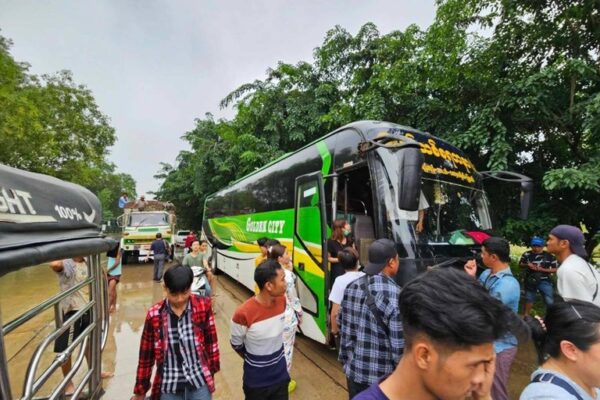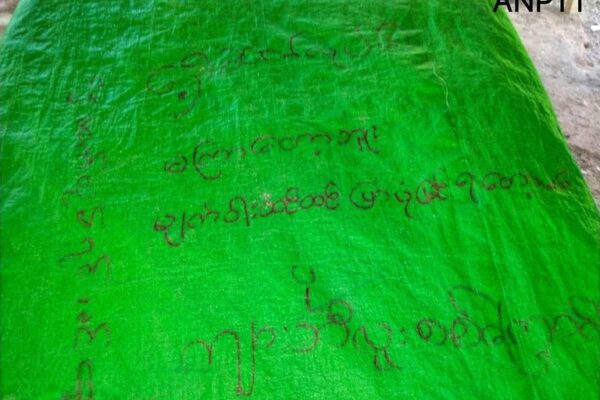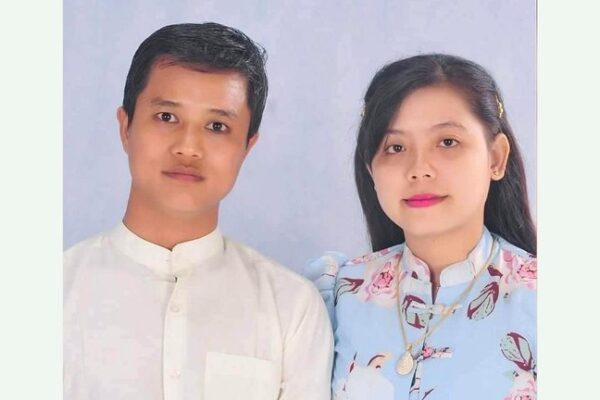Experts say that Hamas militants may be using North Korean weapons after footage emerged of a fighter from the Palestinian group carrying a rocket-launcher suspected to originate from the communist nation. The video, recorded shortly after deadly attacks on Israel started last weekend and shared widely on social media, shows several men sitting in the back of a pickup truck brandishing weapons above a face-down, partially clothed woman. A rocket-launcher held by one of the fighters was identified as North Korean in origin by a military and weapons blogger with the handle War Noir in a post on X, formerly Twitter. “A recent video recorded today shows members of the Al-Qassam Brigades (#HAMAS) in #Gaza Strip,” War Noir wrote on Oct. 7. “One of the members can be seen with an uncommon F-7 HE-Frag rocket, originally produced in #NorthKorea (#DPRK).” RFA was not able to conclusively determine if the weapon was North Korean, but its shape closely resembles the F-7 as depicted in the North Korean Small Arms and Light Weapons Recognition Guide published in May by the Geneva-based Small Arms Survey research project. Experts said that Palestinians have historically used North Korean weapons, which may have been first purchased by Iran or Syria, and then smuggled to the Hamas-ruled Gaza Strip, circumventing an Israeli-Egyptian embargo that has been in place since 2005. “The Syrians deal with Hezbollah a lot and Hezbollah deals with Hamas a lot,” said Bruce E. Bechtol Jr., a former intelligence officer for the U.S. Defense Intelligence Agency. “A lot of the trade that North Korea does with both Hamas and Hezbollah is deals that they make through the IRGC, the Iranian Republican Guard Corps,” he said. Used in the region In its recent attacks on Israelis, Hamas used weapons originating in a wide range of current and former states, including the United States, the Soviet Union, and North Korea, said N.R. Jenzen-Jones, director of the Armament Research Services intelligence consultancy, or ARES. A preliminary analysis of images reviewed by this consultancy shows “a militant armed with an RPG-7 type shoulder-fired recoilless gun, loaded with an F-7 series high explosive fragmentation (HE-FRAG) munition, produced in North Korea,” Jenzen-Jones said. “These have previously been documented in the region, including in Syria, Iraq, and in the Gaza Strip.” Other images showed militants using what appeared to be a North Korean Type 58 self-loading rifle, a derivative of the well-known AK series, he said. “North Korean arms have previously been documented amongst interdicted supplies provided by Iran to militant groups, and this is believed to be the primary way in which DPRK weapons have come into the possession of Palestinian militants,” he said. “North Korean arms have previously been identified in the hands of the militant factions of Hamas, Palestinian Islamic Jihad, and Democratic Front for the Liberation of Palestine, amongst other groups,” he added. Bechtol said that a North Korean arms shipment was intercepted in Thailand in 2009. A U.N. panel of experts determined the 35 tons of conventional arms and munitions was headed to Iran, and Israeli intelligence believed it was ultimately bound for Hamas and Lebanon-based Hezbollah. Bechtol said the shipment contained rocket propelled grenades, larger rockets, and the F-7. “The North Koreans have also sold the ‘BULSAE’ antitank system to Hamas. It’s a very good antitank system and they could be firing that at Israeli tanks when they’re entering the Gaza Strip here within the next day or two,” said Bechtol. “So North Korea has given them some capabilities that are interesting.” The woman whose body was seen in the video was identified by her family as 22-year old German-Israeli citizen Shani Louk, who was abducted by Hamas militants when they attacked a music festival in Israel close to the Gaza border. She is believed to be alive, but in critical condition at a hospital in Gaza, according to Palestinian sources her mother told German outlet Bild on Tuesday. But Israeli, German or Palestinian officials have not yet confirmed her status or whereabouts. North Korea blames Israel North Korean media, meanwhile, blamed the recent violence on Israel’s “ceaseless criminal acts” against the Palestinian people. According to a report in the state-run Rodong Sinmun newspaper on Tuesday, “a large-scale armed conflict broke out between Palestine’s Islamic resistance movement and Israel.” “The international community called the conflict the result of Israel’s ceaseless criminal acts against the Palestinian people,” and said that the “fundamental” way to end the bloody conflict is to create an independent Palestinian state. That Hamas is using North Korean weapons is not surprising, Bruce Bennett, a defense researcher at the RAND Corporation think tank, told RFA. “North Korea is selling things wherever it can to make hard currency,” said Bennett. “Whether North Korea directly provided it to Hamas or provided it through a third party, I don’t know. But the fact that there is North Korean equipment there does not surprise me at all.” ‘Commercial relationship’ Bennett said the F-7 rocket is an anti-personnel weapon and causes maximum casualties. “It’s not intended to, like, penetrate a tank,” he said. “It’s intended to cause fragmentation, like a terrorist bomb, and maximize the effect against people.” Even though Hamas appears to be using North Korean weapons, it would be inaccurate to describe them as allies, he said. “It’s a commercial relationship which is fed by the politics as well by North Korea being anxious to hurt the United States and anything associated with the United States,” said Bennett. “The scary part of this though is as you think about the future, does North Korea have people on the ground with Hamas watching them do what they’re doing?” he said. “Is North Korea thinking about doing this kind of thing to South Korea? We clearly don’t know at this stage, but I don’t think we can ignore that possibility.” Translated by Claire Shinyoung Oh Lee. Additional reporting by Eugene Whong. Edited by Eugene Whong and Malcolm Foster.






